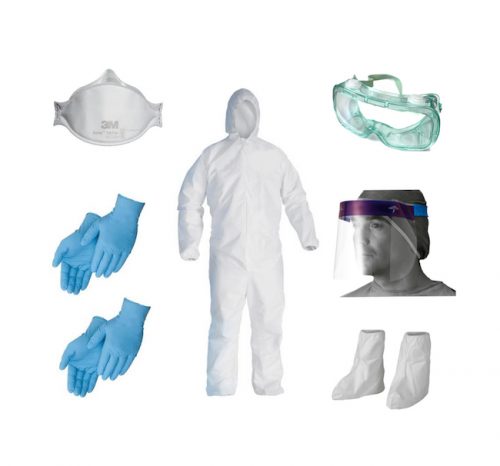Kenya Apologizes to Doctors for Importing “substandard” PPEs, Test Runs Herbal Drug
The Kenyan government has openly admitted that it has been importing substandard personal protection equipment (PPEs) for doctors in efforts to tackle the Covid-19 pandemic in the country. This was made known by the Health minister Mutahi Kagwe who noted that this unfortunately has been putting the lives of healthcare workers at risk. PPEs which usually include gloves facemasks, isolation gowns, eye protection goggles and shields, respirators among others are used by healthcare workers to protect themselves and patients while providing care. The Minister said that the substandard product was as a result of the spike in demand for PPEs worldwide following the outbreak of the coronavirus pandemic. Kagwe said it is only by the grace of God that Kenyan doctors have not fallen sick after using the substandard PPEs. Kagwe said most of the imported PPEs failed the efficacy tests of Kenya Bureau of Standards (KEBS) and as such Kenya has stopped importing PPEs and will utilise locally made PPEs.

”And I can tell you that the PPEs that are being made locally were passed by KEBS…I tried to get the ones we had imported get tested by KEBS and they failed. So the PPEs we’re making locally are superior to the PPEs we were importing before. It is just thanks to God that our doctors have not been falling sick. Some of these imported PPEs are really below standard,” Mutahi said. It is not clear where Kenya has been importing its PPEs from but China has been the world’s largest supplier. Only recently Tanzania President John Pombe Magufuli said African governments should subject the coronavirus test kits to standardized tests because they could be ‘faulty’.
Read also : Ride-sharing Startup Swvl Is Back In Operations In Kenya After Ban
Magufuli said the faulty test kits could be the reason behind the many positive COVID-19 cases on the continent. Currently, there is a shortage of PPEs which has forced many countries to start manufacturing them locally. Like Kenya, Uganda President Yoweri Museveni has also called on local manufacturers to start making PPEs from within the country. Already, face masks that the government intends to distribute to all Ugandans above 6 years are to be manufactured locally by several companies. Meanwhile, Kenya has stepped up efforts to find a local treatment for COVID-19. The Kenya Medical Research Institute (KEMRI), East Africa’s leading medical research facility, is testing the efficacy of a herbal medicine known as Zedupex. The search for both a cure and a vaccine for the coronavirus has intensified around the globe, including in Kenya, as medical researchers race to find the elusive remedy.
Dr Festus Tolo of KEMRI is the lead scientist tasked with finding out whether a herbal-based drug will be effective against COVID-19. Zedupex, developed in 2015 by Kenyan researchers, has been used in the treatment of herpes. Tolo says his team does not know yet whether the drug will work against the virus. “We are still in very early stages. We cannot be able to say, knowing that the herpes simplex virus is a DNA virus and the coronavirus is an RNA virus,” he said. “This really means that we need to — first of all — to confirm, check whether there’s activity before we can be able to really say this is a product we can explore further for COVID management.”
Read also : Kenya-based Healthcare Incubator Villgro Awards $100k Cash Grants To East African Startups
Rudi Eggers is with the World Health Organization. Eggers says that standardizing the various herbal cures could be quite a challenge. “In other medicines, we find that there are specific levels of the active ingredient and in herbal cures frequently you find varied components and then also levels of those components in there,” Eggers said. “So, in fact you’d have to standardize these cures to make sure that you know what is in them and what component is actually acting. So that’s quite a step to be taken before actually evaluating these cures.”
Dr Kefa Bosire an ethnobiologist, based at the University of Nairobi, also has reservations about traditional cures, saying that mass production could be an issue. “The immediate challenge we would face is getting sufficient quantities of the plant so that we can prepare them to supply the number of patients that might require on a short notice, like we have experienced during this pandemic,” Bosire said. “So, this would require a lot of work to go into identifying the best way to upscale the growing and collection of these materials.” Despite these hurdles, researchers at KEMRI are pressing ahead with their study of herbal treatments for COVID-19. Kenya itself has seen more than 1,000 confirmed cases of coronavirus disease so far, and about 50 deaths.
Kelechi Deca

Kelechi Deca has over two decades of media experience, he has traveled to over 77 countries reporting on multilateral development institutions, international business, trade, travels, culture, and diplomacy. He is also a petrol head with in-depth knowledge of automobiles and the auto industry

